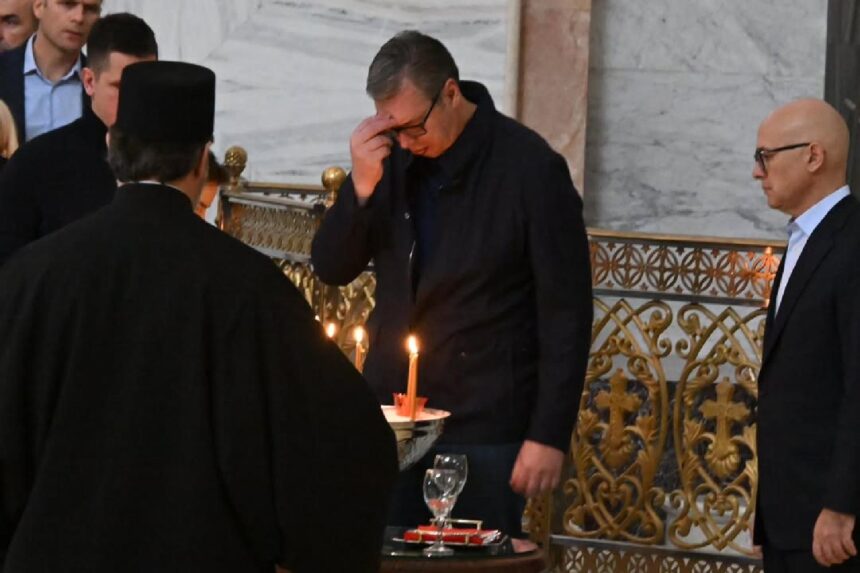Serbia’s President Aleksandar Vučić is facing one of the most turbulent periods of his rule. As public discontent grows and international pressure intensifies, his government appears to have entered what analysts describe as a “panic phase”—a desperate attempt to maintain control through propaganda, repression, and last-minute political improvisations.
Following Vučić’s insensitive remarks about the tragic accident in Novi Sad, the government scrambled to contain public outrage. A hastily written apology, a day of mourning, and a high-profile church appearance followed in what critics call a “crisis marketing operation” designed to humanize the president. Yet, observers say these moves only further exposed his moral bankruptcy and lack of empathy.
During his address at the Church of Saint Sava, Vučić used the occasion to attack protesters and mock grieving families, including Dijana Hrka, the mother of a boy killed in the Novi Sad tragedy, who has been on hunger strike demanding justice. His words, analysts say, revealed both arrogance and fear, showing a leader increasingly detached from reality.
Political analyst Dragan Popović describes Vučić’s current strategy as “try everything at once”, from reducing prices to police brutality, reflecting a chaotic and inconsistent policy. “These are not coherent messages, and they show a regime that has lost direction,” Popović said.
Meanwhile, Serbia’s reputation abroad is deteriorating. The European Commission’s latest report condemned the government’s record on rule of law, corruption, and media freedom, prompting Sweden to suspend part of its financial aid to Serbia’s state institutions—redirecting it instead to civil society organizations.
Despite this, Vučić-controlled media continue to flood the public with fabricated polls and propaganda headlines, claiming the president enjoys overwhelming support. Independent experts, however, warn that these numbers are manipulated to maintain an illusion of stability.
According to Professor Dušan Spasojević of the Faculty of Political Sciences, the regime has temporarily managed to reassert control through intimidation and violence, but it remains fundamentally unstable. “They’ve used repression to prove they are still strong, but it only highlights how undemocratic and fragile this government has become,” he noted.
Inside the regime, fear and paranoia are spreading. Vučić has reportedly begun purging officials he deems insufficiently loyal, including school directors and public institution leaders, replacing them with hardliners. Analysts say this signals deep insecurity and a shrinking inner circle driven by fear rather than strategy.
Popović adds that Vučić’s popularity rests on promises of peace and stability, yet both have collapsed. “Everywhere there are protests, everywhere there is anger. His voters are beginning to realize he can no longer deliver what he once promised,” Popović said. “He is not a new Tito — and that realization may mark the beginning of his end.”
Until then, Serbia faces further repression, arbitrary arrests, and erosion of human and democratic values—a tragic reflection of how far the country has drifted from the ideals it once aspired to.







